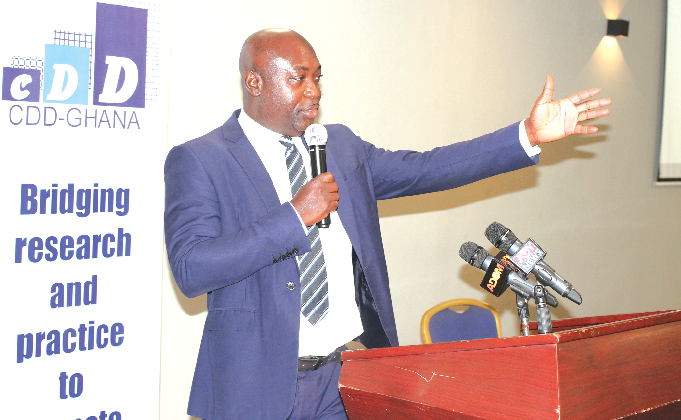
Monetising politics getting out of hand — CDD
The Ghana Centre for Democratic Development (CDD-Ghana) has observed that the absence of an effective campaign financing regime has created a situation where money plays a huge role in Ghanaian politics.
It said the situation was providing opportunities for ill-intentioned donors, local criminals and organised crime actors to gain influence over elected officials by financially supporting their campaigns.
That, it stressed, did not only undermine democracy, good governance and the rule of law, but also had negative consequences for economic and social development.
Report
In a report after a study into the role of money in Ghanaian politics, the CDD observed that large sums of money used in political party campaigns made the process susceptible to the demand and supply-side of corruption and illicit money.
The study was undertaken in 2020, with funding from the Adam Smith International (ASI) to understand the role of money in Ghana’s campaign financing, as well as investigate the sources of campaign funding, the role of illicit money and the nature of illicit money in campaign financing in Ghana.
According to the CDD, the latest research was a follow up to earlier exercises undertaken in 2018, which had concluded that the cost of politics and campaign financing in Ghana was high and increased astronomically from one election cycle to another. For instance, the cost of vying for political power regarding competing in primaries and parliamentary elections by an aspiring Ghanaian politician is now GH¢ 4 million ($693,000).
The latest figure has shot up by 59 per cent from GH¢ 389,803 or $85,000 that was revealed in a 2018 report on a study by CDD-Ghana and the Westminster Foundation for Democracy (WFD).
Forum, findings
In 2020,the CDD-Ghana, with funding from the Adam Smith International(ASI), undertook the Scoping Study to understand the role of money in Ghana's campaign financing, investigate the sources of campaign funding, as well as the role and nature of illicit money in campaign financing.
At a day's forum in Accra yesterday to disseminate the findings of the latest study, the Lead Consultant, CDD-Ghana, Mr William Nyarko, further indicated that during the post election validation period, it showed that running for presidential elections, would now cost a candidate $100million.
Mr Nyarko was however quick to say that further research needed to be conducted to itemise the cost.
According to Mr Nyarko, the study identified nine financiers of political parties and candidate campaigns, who were allegedly engaged in illicit activities, which included activities of Serious and Organised Crime (SOC).
They are illegal mining and galamsey operators, illegal oil distribution (bunkering) fraudulent business procurement infractions and its associated kickbacks from the award of contracts.
He said key findings included the demand and supply driven side of corruption.
The demand side included where some delegates and citizens expected candidates to provide for their personal needs and public goods while the supply side of the corruption involved candidates who were the biggest spenders invariably succeeding in winning elections.
Legal, regulatory framework
The study also looked at political party financing in the context of the legal and regulatory framework. It observed that there were no caps placed on donation amount or funding political parties although the Political Parties Act, 2000 (Act 574) 55(15) states that only a citizen of Ghana may make a contribution or donation to a political party registered in Ghana.
The study equally identified that there was no express prohibition on funds from SOC-related activities.
It also identified that per the regulatory framework, there was no requirement on candidates to file and there was always an open season with no prohibition on time-frame for start of political campaigns except for making it known that there should be no campaigning 24 hours to voting.
Recommendations
Mr Nyarko, therefore, suggested that the Political Parties Act must be amended to include prohibition of funding with illicit sources while donations must also be taxed to encourage transparency in donation.
The campaign period must also be defined as a way of reducing the rising cost of politics.
He said the Electoral Commission and political parties must adopt a formula to determine the rate of increment in filing fees.
Political parties must also reconsider the candidate selection process to mitigate the cost implication in primaries.
Candidates must be required to file returns as it is in the case of the political parties.
